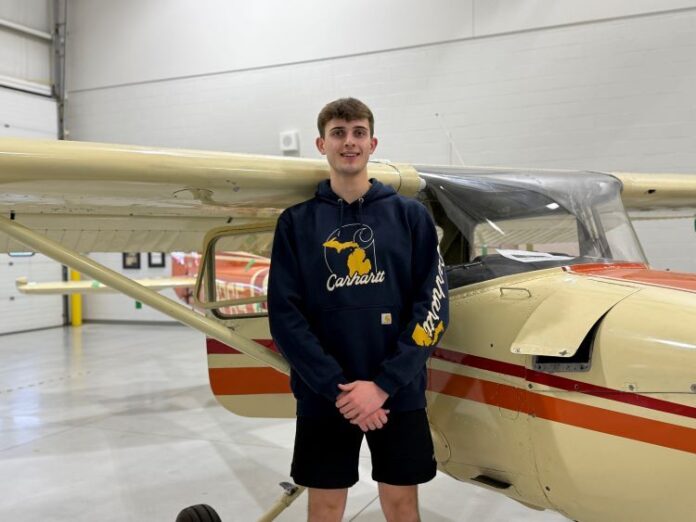Lowell — Patrick Hoke works on a cardboard aircraft during class in Kent Career Technical Center’s Aviation Electronics Program, located in a hangar at Gerald R. Ford International Airport.
With knowledge he’s gained through the program, the Lowell High School senior is designing the miniature plane to be as aerodynamic and light as possible, preparing for a competition with his peers in which he will vie for most creative design and farthest flyer.
“I’m kind of going off the designs of some of the aircraft around here and taking what I like and trying to make my aircraft similar,” he said, referring to the many small aircrafts he’s been learning electronics on in the hangar over the past two years.
Patrick will graduate May 23 with experience tinkering with planes and potentially an FAA certification in hand.
‘You feel totally free up there and like you’re in control. It’s something that not a lot of people are ever going to get to say that they did.’
— senior Patrick Hoke
He’s now looking ahead to the next step toward his dream career in the pilot’s seat.
What is your dream? “To become an airline pilot for a major airline.”
How are you pursuing your dream? “There are so many ways to get there and one of the ways is to go the college route,” he said, describing his plan to attend Grand Valley State University and pursue a bachelor’s degree in business administration.
“(The degree) is a general overview of what it takes to lead and critically think in a business setting, which relates to piloting well, especially once you get to bigger airlines.”
While in college, he also plans to complete flight training with his dad, Aaron Hoke, a certified flight instructor at Sparta Community Airport.
Why is this your dream? “I’ve gotten to fly with my dad a lot. It’s a path I’ve already had a little bit of experience in — seeing how much my dad loves flying and his passion for it, I think it just really passed on to me.”
Since he was about 10, Patrick has gone up with his dad many times in the Cessna 150 in which Hoke trains future pilots.
“He let me take the controls and everything and just kind of steer it around. You feel totally free up there and like you’re in control. It’s something that not a lot of people are ever going to get to say that they did — to have that as your everyday (job) and to have those awesome views and being able to see everything up there. It’s really kind of peaceful up there.”
Tell me about the program you are in now; how has it helped you prepare for the next step? “It’s called Aviation Electronics, Avionics for short. … You learn about the aircraft electronics and what the pilots would actually be using and all of the systems throughout the aircraft, electrical-wise. (It’s) about fixing the internal electronics as well as how they all work and the controls a pilot would be using.”
How are school and your teachers helping you achieve your dream? “(Aviation Electronics instructor) Mr. (Sebastian) Tramper has been really helpful. … He makes really good lessons. He doesn’t just talk to us, he really tries to explain things a lot more thoroughly and then makes good tests as well — hard tests you have to study for, but really relating to what we need to know.
“All of his lessons are structured toward our Aircraft Electronics Technician (AET) certification. That’s a real FAA certification we are going to be taking (a test to earn).”
One of Patrick’s crew coaches, Jeff Carbines, also flies for American Airlines.
“(Jeff) tells me a lot about (being a commercial pilot). He never went to college, but straight out of high school started flight training and he got into the airlines.
“He told me about how they work and I asked him what the work-life balance is like for them, and he had all great things to say about that. What really stuck with me is once a pilot starts with an airline, they really stay with that airline.”
What has been a highlight of being in the Avionics program? “Twenty percent of our entire year is dedicated to our future. That means every Friday we have a guest speaker out here — whether it’s a CEO of some avionics company or someone in aircraft detailing. We’ve had Army and Navy and Air Force recruiters. (The Avionics instructors) are really dedicated to that transition from the class to actually working.
“I’m considering later in life going into the Air Force, based on what the recruiters have said.”
Read more from Lowell:
• Future dispatcher: ‘Knowing you are helping people is amazing’
• Into the wild: young adventurers test survival skills









